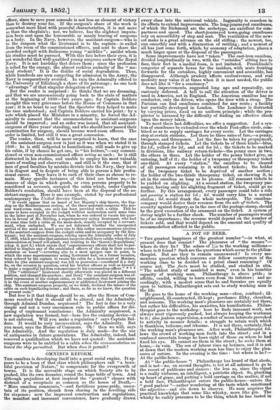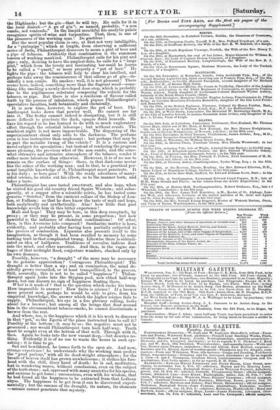A POT OF BEER.
" THE greatest happiness of the greatest number "—in what, at present does that consist ? The pleasures of " the masses"— where do they lie ? The solace of Lle to the working millions— where is it found ? Such are the questions which occur to the philan- thropist. But are they to remain unanswered P Is every mo- mentous question which concerns our fellow countrymen of the working class to be decided on a priori closet reasoning? Of course not. The facts must be studied, and studied in situ. " The noblest study of mankind is man," even in his humbler capacity of working man. Philanthropy is above pride ; is afthble, candid, willing to learn even from its inferiors ; and ac- cordingly, with a modest sense that he and Socrates are equally open to tuition, Philanthropist sets out to study working man in the life.
He goes to the home of the working man—close, confined;
ill- neighboured, ill-constructed, ill-kept; perchance filthy, cheerless, and noisome. The working man's pleasures are certainly not there, but rather his difficulties, his anxieties, his humiliations. Philan- thropist goes to the workshop : here he finds incessant work, not always most vigorously pushed, but always keeping the workman to it ; also jealous supervision, a conflict of mean interests provoked to activity in meaner details ; a struggle to retain work which is thankless, toilsome, and irksome. It is not there, certainly, that the working man's pleasures are. After work, Philanthropist fol- lows the crowd of working men forth into the street; and in a confused uncertain lounge he loses sight of those on whom he had fixed his eye. He cannot see them in the street ; he seeks them at home,—in vain. The son of labour rises up betimes, and it is not at dawn that the modern working man has time to enjoy the plea- sures of nature. In the evening is the time : but where is he P — At the public-house. At " the public-house "! Philanthropy has heard of that abode, and is not—no, on second thoughts, is not at all ashamed to go to the resort of publicans and sinners : the less so, since the object is a really virtuous, an intelligent, a patriotic object So, plucking up heart of grace, and putting a bold carriage on the matter, if not a bold face, Philanthropist enters the public-house—enters the " good parlour "—rather wondering at the taste which sanctioned the adjective—and sits down to observe. He soon acquires the practical knowledge that some like whisky, more like gm. The whisky he rashly presumes to be the thing which he has tasted in
the Highlands; but the gin—that he will try. He calls for it in the local dialect—" A go of gin"; so named, probably, " a non eimdo, sed veniendo." In the limpid mouthful his analytic palate recognizes spirits-of-wine and turpentine. That, then, is one of the pleasures of the working man ! De gnstibus !
But the most popular claim is one, at first not very intelligible, for a " pintnpipe" ; which at length, from observing a sufficient aeries of facts, Philanthropist discovers to mean a pint of beer and a pipe of tobacco. Evidently that combination is the summum bonnm of working mankind. Philanthropist calls for his pint and pipe ; only, desiring to have the amplest data, he calls for a " large pint," which from the lovely and fascinating bar-maid he learns to be called a " quart," or more properly a " pot of beer." He lights the pipe : the tobacco will help to clear his intellect, and perhaps take away the reminiscence of that odious go of gin—de- ddedly a non eundo. He smokes : well, it is not pleasant ! There seems here, indeed, something more than the flagrant weed—some- thing like smelling a newly-developed door-step, which is probably due to the argillaceous substance composing the vehicle for the tobacco, or pipe But there is also a residuum of flavour called forth by the process of inhalation, which piques Philanthropist's speculative faculties, both botanieally and chemically.
It is now time, however, to explore the ppoot of beer. Phi- lanthropist looks down that pewter well. He annot see far into it. The frothy summit indeed is dissipating, but it is still more difficult to penetrate the dark, opaque fluid beneath. He fixes his regard as he has learned to do with so much exploratory effect through the celestial telescope ; but without result. The murkiest night is not more impenetrable. The dispersing of the superincumbent cloud only adds to the darkness. The perfume even is less instructive than unpleasant : but perhaps that may be in part the metallic twang of the vehicle ? It is a curious and novel subject for speculation ; but instead of rendering the progress more pleasing, the previous whet of the non eundo, and the some- what obtrusive and intrusive atmosphere of the tobacco, render it rather more laborious than otherwise. However, it is of no use to remain on the surface of things : there, in that darksome nectar lies the solace of the working man ; and to that, to a practical per- sonal tangible knowledge of it, Philanthropist must penetrate. It is his duty ; so here goes ! With the ready adroitness of many- sided science, he sticks out his elbow, as to the manner born, and takes a taste.
Philanthropist has once tasted sweetwort, and also hops, when he visited his good old country friend Squire Western; and subse- quently, at a supper after a scientific soiree, he has tasted some genuine " October," from the eminent cellars of the Bishop of Lon- &a, at Fulham.- so that he does know the taste of malt and hops, both analytically and synthetically. Alas / how little that past knowledge avails him in this bitter experience ! Malt and hops ! They may be here, in this deep receptacle, by proxy ; or they may be present, in some proportion ; but how powerful is the influence of chemical combinations ! Of what, then, is this Avernine lake composed? Saccharine matter is here, evidently, and probably after having been partially sullheted to the process of combustion. Liquorice also presents itself to the imagination, as though it had been recalled to memory by some lurking trait in that complicated twang. Likewise there is subindi- cated an idea of halfpence. Traditions of cocculus indicus float into the mind, and other narcotics. And then, in the vague am- bages of that midnight flood, conjecture wanders, checked only by its own dismays. Possibly, however, "a draught" of the same may be necessary to its genuine appreciation ? Courageous Philanthropist ! The draught is better than a sip ; and on rumination, the mind de- cidedly grows reconciled, or at least tranquillized, to the process. Still, assuredly, this is not to be called -" happiness"? Philan- thropist again looks into the Stygian pool, now ebbed half-way down, but can discern no sign of happiness floating there. What is it made of ? that is the question which racks his brain. How impossible to answer ! How finite is science ! If a brewer were present now, perhaps he would be able to give, from his empirical knowledge, the answer which the higher science fails to supply. Philanthropist, his eye in a fine phrensy rolling, looks about for a brewer; but among all the beings that float around him in the eireurniunbient tobacco-smoke, he cannot discriminate a brewer from the rest.
And where, too, is the happiness which it is his work to discover in that " pot," as the Egeria of the place instructed him to call it ? Possibly at the bottom—it may be so; the negative must not be presumed ; nor would Philanthropist turn back half-way. Truth must be sought even at the bottom of that well. Through with it, then. Again he looks into the now vacant deep,—but descries no- thing. Evidently it is of no use to waste the hours in such eye- asking ; it is time to go.
. Sad, and bewildered, he issues forth to the open air. And now, strange experience ! he understands why the working man prefers the "good parlour," with all its dead-weight atmosphere; for the breath of heaven itself has grown unwholesome ; it strikes his fore- head with the chill, dizzy hand of death: he is sad, meditative, lost in wandering mazes, without conclusions, even on the subject of the kerb-stone; sad, oppressed with many anxieties for his species, and anxious to get home ; unconscious, even with his wisdom, that he had found all the happiness to be extracted from that Lethean abyss. The happiness to be got from it can be discovered experi- mentally; but the essence of the draught, its nature, its elements —science cannot penetrate that mystery.



































 Previous page
Previous page